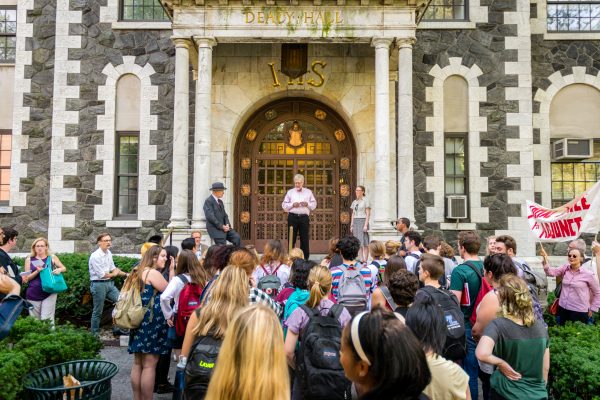Adjuncts Demand Better Working Conditions
September 29, 2016
Fordham Faculty United (FFU), which represents adjunct and contingent faculty at Fordham, staged a rally at the Rose Hill campus on Thursday, Sept. 8, and delivered a petition contending for better wages and working conditions to the administration.
According to a press release from FFU, the administration told those at the rally that they would respond to the demands in the petition by Friday, Sept. 16.
Adjunct faculty make up nearly 50 percent of instructors at the university, but their $4,000 per course wage “does not reflect this reality,” Alan Trevithick said in the press release.
In a statement from Bob Howe, senior director of communications for the university, he noted that the minimum pay for adjunct faculty for teaching a course that meets for three hours a week is $4,000, but can be paid up to $5,500 per course depending on the credentials and experience of the adjunct faculty member.
For a course that meets three hours per week, adjunct faculty will spend three hours teaching, four hours preparing and grading and two hours holding office hours, according to the statement from Howe. This comes to nine hours total per week.
Given that there are 15 weeks in a semester, that comes to 135 hours spent per course taught, Howe wrote, which translates to an hourly rate of $29.63 an hour.
“Fordham employs adjuncts to offer students instruction from professionals working in fields related to the students’ course of study, and to provide flexibility in course scheduling, release time for tenure and tenure-track faculty, and more varied curriculum offerings,” Howe concluded.
Many adjunct faculty take on courses at other institutions in addition to the work they do at Fordham to make ends meet, Trevithick explained.
“For the last 10 or 12 years, I’ve always taught two classes at Fordham, since I’m not allowed to teach more,” he said. “None of us are allowed to teach more than two. And then I teach anywhere from four to five classes at other colleges and universities. Right now I’m teaching seven.”
“The big problem for me is an ethical one, a moral question,” Christopher Brandt, an English and communications adjunct professor, said.
Brandt believes that there are far too many administrators who “are well-paid, and that is compared with an adjunct getting $16,000 a year at Fordham. That doesn’t stand up to any kind of ethical or moral scrutiny,” he said.
Brandt said that adjunct faculty are exploited by the university and it is “a betrayal of all that is right about universities, about education, about this relationship between students and teachers, which also gets destroyed because the teachers have to leave to go to their other job.”
Like Trevithick, Brandt also takes on work outside of Fordham to make ends meet. In addition to teaching at Fordham, he works at a theater company and says his two jobs and social security are the only things that allow him to live in New York.
“It’s pretty scary as you get closer and closer to the last checks,” Kathryn Krasinski, Ph.D., adjunct professor of anthropology, said.
Krasinski does not teach summer classes at Fordham so she receives her last check from in mid-April and goes five months before she receives her next Fordham check in mid-September. “I call those the ‘hungry times of the year,’” she said.
During the school year Krasinski goes two to three months without receiving any income while teaching two classes because Fordham gives adjunct faculty six checks per semester. “That’s impossible,” she said. “My strategy is to take on a lot more jobs, and I also stockpile food because when you get to those times, you just don’t have money in the account to buy that kind of stuff.”
Adjunct faculty “definitely do not have to be treated this way, especially by a Jesuit institution, which claims to know something about social justice. Instead it perpetuates the very system that creates a very needy, vulnerable group of people,” Krasinski said.
Krasinski noted that many of the adjunct professors work beyond what they are compensated for in their contracts. Developing new presentations and lectures and incorporating new information into their classes takes time.
“[Students] have a really huge price-tag to attend school here and half of their classes are taught by people who are too busy and are not provided the resources necessary to provide the education and research experiences they need and deserve,” Krasinski said.
“Now, it’s not to say that if you have a tenure-track line here, that you’re not going to be busy, of course you’re busy,” Krasinski continued. “But you don’t have hungry times and are compensated to focus here, to bring your research here, to work with your students here.”
To discuss the wages and treatment of adjunct faculty, FFU will hold a public forum with the administration on Thursday, Oct. 6 at 5 p.m., though the administration has yet to confirm that they will attend.












